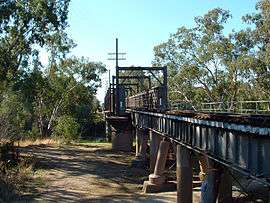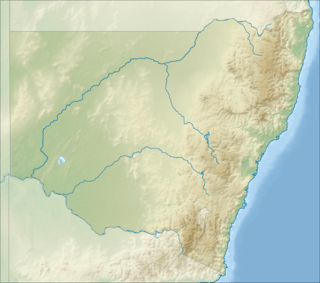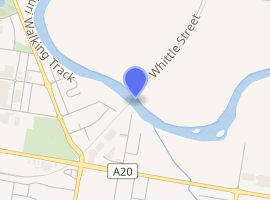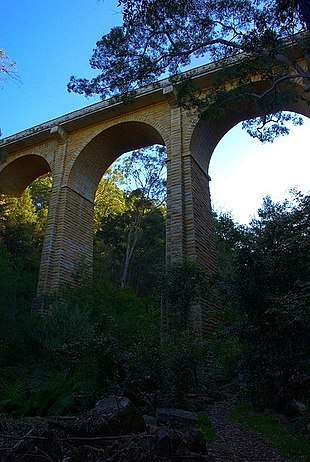Murrumbidgee River railway bridge, Wagga Wagga
The Murrumbidgee River railway bridge is a former railway bridge that carried the Main Southern railway line across the Murrumbidgee River in Wagga Wagga, Australia. The original bridge, erected in 1881, was replaced in 2006.
Murrumbidgee River railway bridge, Wagga Wagga | |
|---|---|
 Original bridge in May 2006 | |
 Location in New South Wales | |
| Coordinates | 35°06′57″S 147°22′58″E |
| Carries | Main Southern railway line |
| Crosses | Murrumbidgee River |
| Locale | Wagga Wagga, Riverina, New South Wales, Australia |
| Owner | Transport Asset Holding Entity |
| Characteristics | |
| Design | Lattice truss |
| Total length | 3,078 metres (10,100 ft) |
| Longest span | 4 x 46 metres (150 ft) |
| Rail characteristics | |
| Track gauge | 4 ft 8 1⁄2 in (1,435 mm) standard gauge |
| History | |
| Constructed by | Messrs. R. & A. Amos |
| Fabrication by | P. & W. McClellan & Co, Scotland |
| Construction start | 1871 |
| Construction end | December 1880 |
| Opened | 16 January 1881 |
| Closed | 30 December 2006 |

| |
Original bridge
The original four span wrought iron lattice truss bridge opened on 16 January 1881. It was the second oldest bridge out of the twelve related wrought iron lattice truss series bridges built in Australia. Each of the four lattice truss spans were 46 metres (150 ft) long which joined onto what was thought to be the longest timber viaduct in Australia.[1][2][3][4] The bridge was considered as of major importance to the history of bridge engineering in Australia.[2][5][6]
The spans were manufactured by P. & W. McClellan & Co., Glasgow weighing a combined 790 tonnes (870 short tons). The northern approach was originally built with 215 timber trestles.[7] These were replaced with steel trestles over a four year period from 1897. The trestles were strengthened in 1994 as part of the One Nation project.[8] By 2000 a 20 km/h (12 mph) speed restriction over the bridge had been imposed.[9]
Replacement bridge
The bridge was removed and replaced with a new concrete bridge during a four-day shut down from 30 December 2006.[10] The wrought iron lattice railway bridge was cut away using oxy cutters. One cut section of the bridge was donated to railway preservation group Tumbarail at Ladysmith.[11] The rest of the bridge was taken to Port Kembla for disposal.[8] The new bridge allowed an 80 km/h (50 mph) speed limit to be introduced.[12]
Engineering heritage award
The bridge received a Historic Engineering Marker from Engineers Australia as part of its Engineering Heritage Recognition Program.[13]
See also
- List of railway bridges in New South Wales
References
- "The reconstruction of the Wagga viaduct". Australian Railway Historical Society Bulletin. Australian Railway Historical Society (591): 3–15. January 1987.
- "Murrumbidgee River Rail Bridge, Wagga Wagga, NSW (Place ID 15910)". Australian Heritage Database. Department of the Environment. Retrieved 30 January 2007.
- Iron Lattice Girder Railway Bridges National Trust of Australia
- Railway Lattice Bridge and Viaducts Institution of Engineers
- "Iron Lattice Girder Railway Bridges" (PDF). Endangered Places. National Trust of Australia. Archived from the original (pdf) on 8 October 2006. Retrieved 30 January 2007.
- "Wagga Wagga" (PDF). Railway Lattice Bridge and Viaducts. Institution of Engineers. Archived from the original (pdf) on 31 December 2006. Retrieved 30 January 2007.
- "Railway Communication". The Sydney Mail and New South Wales Advertiser. LXIV (1939). New South Wales, Australia. 4 September 1897. p. 497 – via National Library of Australia.
- "Wagga Wagga Bridge" Railway Digest March 2007 pages 23-25
- "Here & There". Australian Railway Historical Society Bulletin. Australian Railway Historical Society (778): 18. August 2002.
- ARTC New Wagga Rail Bridge Opens for Business Australian Rail Track Corporation 2 January 2007
- New $16m bridge for Wagga The Daily Advertiser 30 December 2006
- "Intelligence" Railway Gazette International March 2007 page 130
- "Wagga Wagga Railway Lattice Bridge and Viaducts, Murrumbidgee River, 1880-". Engineers Australia. Retrieved 8 May 2020.
External links
![]()
